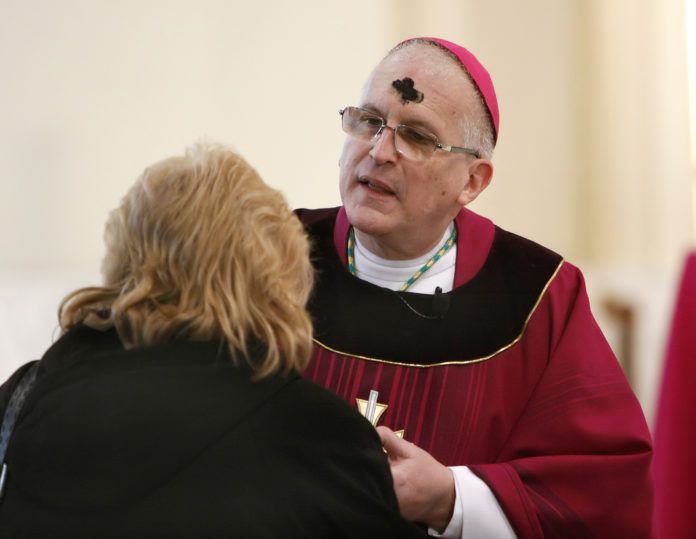
Click here to subscribe today or Login.
Upset with Misericordia over speaker at Diversity Institute, bishop advocates closing it.
By Mark Guydish [email protected]
Education Reporter
SCRANTON – Diocese of Scranton Bishop Joseph Martino fired another salvo at Misericordia University on Tuesday, issuing a statement that challenged the school to prove it teaches “Catholic morality regarding sexuality and homosexuality,” and asking the university “to seriously consider discontinuing its Diversity Institute.”
Founded in 1991, the institute has become a diffuse and ubiquitous presence in the region, allied with numerous school districts, universities, businesses, governments and organizations. Its Web site lists 31 advisory board members from a wide range of backgrounds and more than 50 clients that have used the institute’s services through the years in dealing with changing ethnic and cultural demographics.
None of which drew much notice from the diocese through those years, until the institute invited author and activist Keith Boykin to speak on Feb. 17. Martino issued a stinging rebuke of that decision, noting Boykin has written books and advocated for homosexual causes and same- sex marriage, a stance antithetical to Church teachings.
Martino expressed “absolute disapproval” at Boykin’s appearance on campus, and said that by inviting him, Misericordia was “seriously failing in maintaining its Catholic identity.”
The new statement released Tuesday repeated much of those criticisms verbatim, noted that the university had responded by insisting it is “committed deeply to its Catholic mission” and essentially telling the school to back up that claim.
“The institution should convey to its alumni, and in fact to all the faithful of the Diocese of Scranton, its efforts to teach Catholic morality regarding sexuality and homosexuality. In doing this, the Bishop believes the school should speak precisely, naming courses, content and even catalog numbers,” the statement said.
Martino took aim directly at the Diversity Institute, arguing that “students attending a Catholic institution should have a clear understanding that while all persons should be treated with dignity, homosexual activity is not condoned by the Church and should never be construed as acceptable behavior.” He then posed the suggestion that the institute be shut down.
“Viewpoints that are in direct opposition to Catholic teaching should not be presented under the guise of ‘diversity.’ Doing so within a formal structure sanctioned by the institution gives the impression that these viewpoints are acceptable, or that all morality is relative.”
Misericordia responded with a terse statement repeating its commitment “to its Catholic mission and the teachings of the Catholic Church for 85 years,” saying it “welcomes the opportunity to discuss these matters further” with Martino, but that “the university will not make any further public comments.”
Misericordia employees may not be saying much, but those who have worked with the Diversity Institute were quick to praise its work during the last 17 years.
Dallas School District Superintendent Frank Galicki said he has dealt with the institute since his days as high school principal, and that Assistant Superintendent Paul Reinert sits on the institute’s advisory board. The school has used speakers provided by the institute, sent students to the institute’s annual “multicultural camp,” and participated in a student exchange program between the predominately white and rural Dallas schools and the more ethnically varied Wilkes-Barre area schools.
“It’s been very positive,” Galicki said, “I think it serves a good purpose, as a resource for speakers and as a way to get kids to expand their perspectives. You get students in the microcosm of the Dallas School District and sometimes they experience a very limited slice of life.” He also noted that “I’m not aware of another resource” that could provide the same services in the region
Luzerne County Head Start Executive Director Lynn Evans Biga said her organization has used the Diversity Institute for staff training “I believe in their work, it helps to open people’s minds and open doors.”
Luzerne County Human Services Executive Director Joseph DeVizia has been involved with the Diversity Institute almost since its inception. He said he was among the original members of the advisory board and still serves that capacity, though his schedule since taking the county job has forced him to miss meetings in recent months.
DeVizia is also a deacon serving in the diocese, and he stressed that “the bishop has expressed concerns about certain things, and I have to support him in his concerns.”
But he touted the institute’s work in helping bridge ethnic and cultural chasms in the community, as well as making his own job easier through the years by helping him better understand the people he worked with, including the mentally challenged and the victims of racism.
“The more I understand the differences in other people, the better I can understand myself,” DeVizia said, “That’s part of what the Diversity Institute has done for me.”
The institute has also “rallied around victims of racism” or other prejudice, DeVizia said. “That’s so important to the people who experienced that.”
He cited vandalism at Congregation Ohav Zedek in Wilkes-Barre last March, when the doors were marked with Nazi symbols and words. A rally was held to show support for members of the congregation. That, DeVizia said, is the type of community response the Diversity Institute helps create.
“They will say ‘We’re here to walk that difficult journey,’ ” DeVizia said, “ ‘We care about you and want to right this wrong.’




